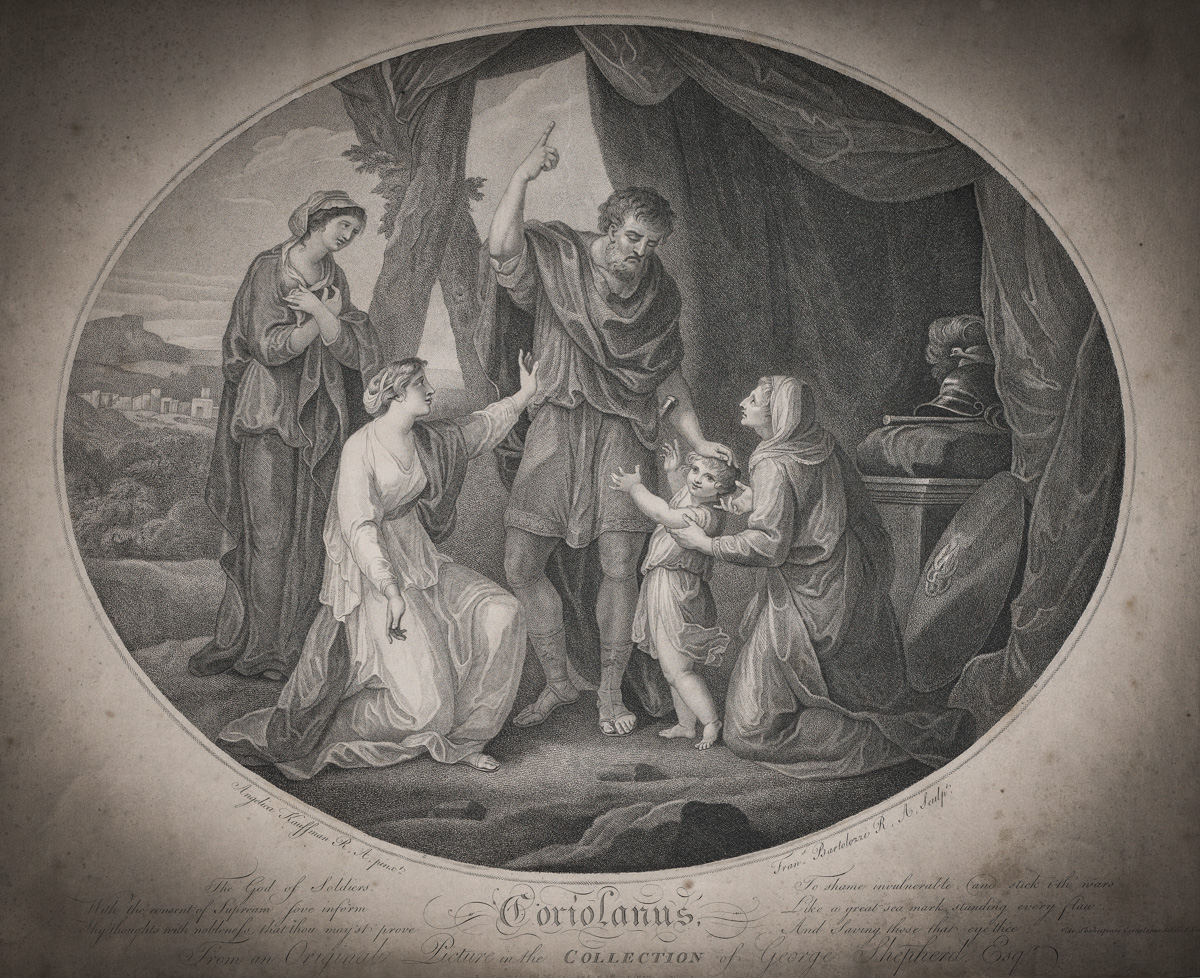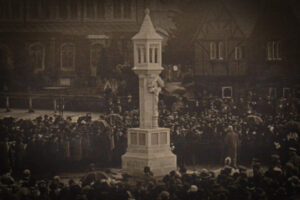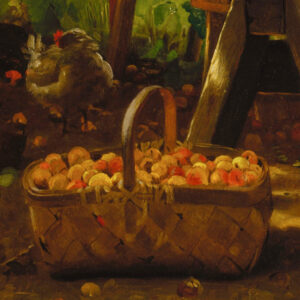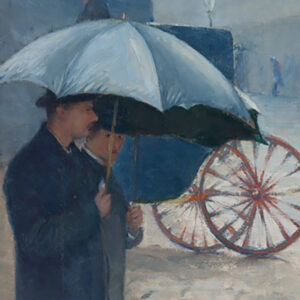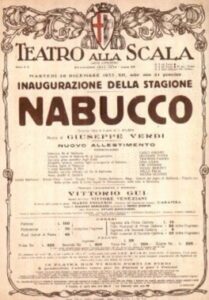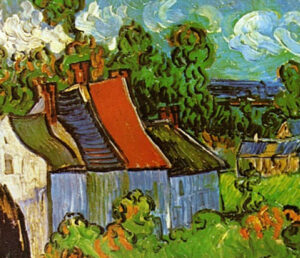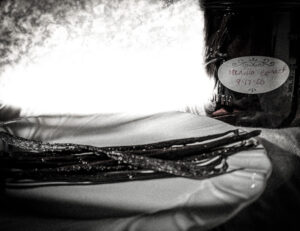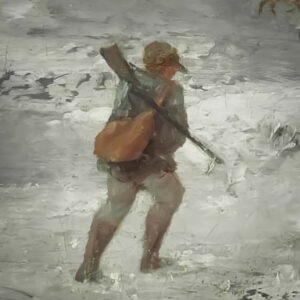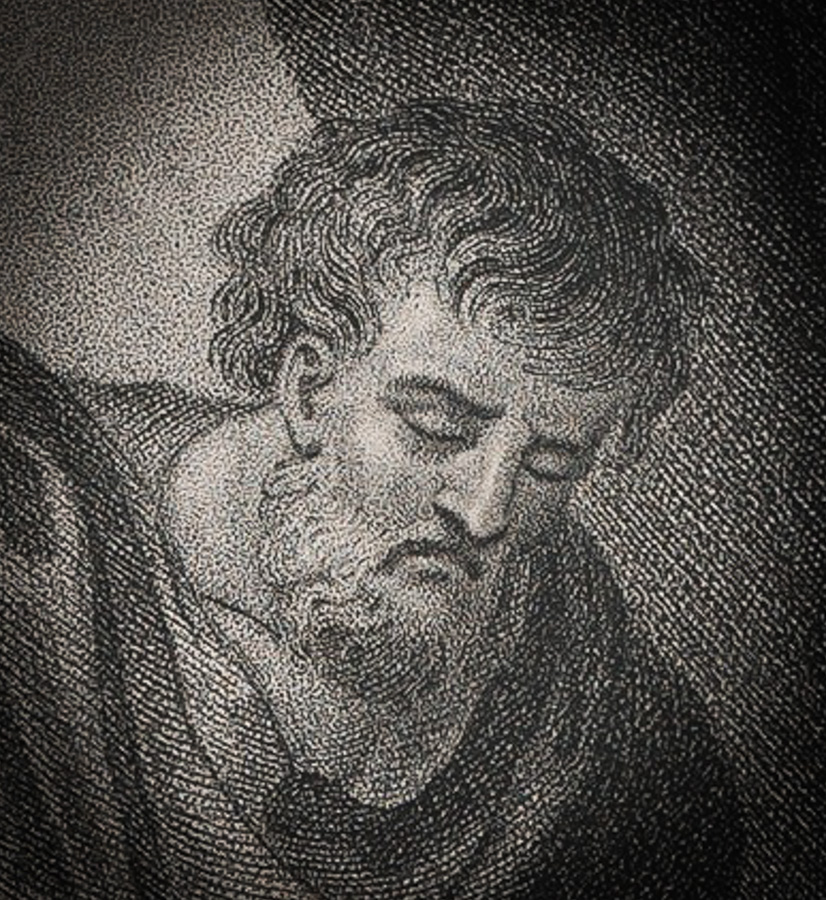
Shakespeare & the Fate of America
A Wandering Review of Coriolanus
Fr. Anthony Giambrone

“What’s the matter, you dissentious rogues, that, rubbing the poor itch of your opinion, make yourselves scabs?” Does any character in the whole Shakespearean canon have opening lines to match those of the proud Caius Martius, soon to bear the honorific agnomen Coriolanus? The immense disdain of this eponymous hero of the most underestimated of all the Bard’s great tragic triumphs is the exact Shakespearean equivalent, plotted among Roman patricians and plebs, of what in our own idiom of elitist disdain would be a celebrated sound bite: “Deplorables.” One can lament the lack of iambic diction among our modern elites, for the tragic hate of class against class merits a corresponding poetic elevation (from which the better to look down one’s nose). Elizabethan tweets might be imagined with a more majestic vent of the toweringly spiteful spleen: “You common cry of curs, whose breath I hate / as reek o’th’ rotten fens whose loves I prize / as the dead carcasses of unburied men / that do corrupt my air.”
The true tragedy of Coriolanus has not been grasped until he is recognized to be more than his unvarnished hate, however. He is a man of peerless ability. Bred for rule, he is a one-man war machine, indispensable to the life and welfare of his country. He is the spirited face of thumos as it functions in Plato’s Republic. He is, indeed, with his matron mother, the living embodiment of the mos maiorum — the ancestral, unwritten rule of proper Roman existence. An incarnation of courage and valor, a bulwark made invincible to shame, Coriolanus is the vital greatness that made the greatness that was Rome. Yet he cannot abide the Roman masses. He detests them.
Fourth Citizen: You have deserved nobly of your country, and you have not deserved nobly.
Coriolanus: Your enigma?
Fourth Citizen: You have been a scourge to her enemies, you have been a rod to her friends. You have not, indeed, loved the common people.
Coriolanus: You should account me the more virtuous that I have not been common in my love.
If Coriolanus is the uncommon spirit that rules over the Romans’ indomitable rise—that spirited and irascible warlike virility, that noble pietas towards family and nation—he is not, for that very reason, Plato’s philosopher king. He is not governed by the just rule of logos, disposed to give each man of each class his warranted due. And any government so conceived cannot long endure.
He is not governed by the just rule of logos, disposed to give each man of each class his warranted due. And any government so conceived cannot long endure.
Coriolanus’ tragedy is thus for Shakespeare the tragedy of the Roman Republic as such. The play, indeed, is Shakespeare’s exploration and study of what Edward Gibbon later undertook in his classic history, The Decline and Fall of the Roman Empire. The difference, however, is major and it is twofold. First, Coriolanus is not a historical theory about some deadly external or superfluous force that managed to tear down mighty Rome. It is the work of a dramatist who diagnoses with Aristotelian precision a great society’s tragic internal flaw: for the very virtue that made the Empire great is the same virtue that destroyed the Republic. And that destructive greatness, that mortally excessive greatness, bears the tragic visage of Coriolanus. Second, the object of Shakespeare’s specific political interest is precisely the Roman Republic, not its Empire, which in its own time would obviously also decline and fall (for reasons that, despite Gibbon, are still much debated). In Julius Caesar and Antony and Cleopatra, the two other parts of Shakespeare’s little Roman Trilogy, the poet’s analysis of this loss of an original republican polity is brilliantly pursued.
While other nations have chosen Greece as a model, America has long chosen Rome. There has been a long fascination in American thought with Gibbon’s version of the tragic destiny of the Roman empire. Decadence and barbarian invasions (though not Gibbon’s reasons) thus loom large in the popular mind as a monitory parable of the death of national greatness. But for the American Founding Fathers, the model was decidedly the Rome of the Republic. Much more interesting and pertinent, therefore—at least from where we still stand—is Shakespeare’s version of Rome’s tragic story, which tells not of invaders from without, but rather of barbarians within. In this light, three brief insights from the brilliant tale of Coriolanus merit attention as we consider just where we do in fact stand, in an era that has seen a bare-chested man with buffalo horns stand on the floor of the American Senate.
First: the tragedy of Coriolanus begins with a scene of violent corn riots. The people are famished and raging to kill. Meanwhile, the patricians rest comfortably, “their storehouses crammed with grain.” So the plebs storm the Capitol armed with pikes, where they intend to kill Martius directly, whom they designate “chief enemy of the people,” for he represents for them the worst of a guilty elitist regime, excessively proud and resolutely unready to share with them even the smallest dignity by which men live. 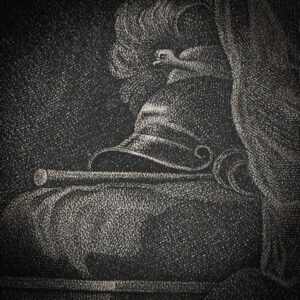 In this thirst for blood coursing through the mob, righteously indignant though the people may be, we discover that the crowd itself is also a mighty thumotic force, a collective actor similarly moved by violent antipathy. A sentiment is present here that will soon be tragically stoked through the ambitious agency of the people’s two tribunes—the institutionalized voice of populist opinion—who reveal that even the lowly plebs are not immune to pride and ambition. The full reciprocity of the mutual antipathy destructively at work in Rome finds its most dramatic, acute expression at the turning point of the plot in Act 3, Scene 3, when Brutus, one of the tribunes, agitates the crowd to reverse their voice and strip Coriolanus of his consulship: a dishonor that blends impeachment and the changing of a voting result.
In this thirst for blood coursing through the mob, righteously indignant though the people may be, we discover that the crowd itself is also a mighty thumotic force, a collective actor similarly moved by violent antipathy. A sentiment is present here that will soon be tragically stoked through the ambitious agency of the people’s two tribunes—the institutionalized voice of populist opinion—who reveal that even the lowly plebs are not immune to pride and ambition. The full reciprocity of the mutual antipathy destructively at work in Rome finds its most dramatic, acute expression at the turning point of the plot in Act 3, Scene 3, when Brutus, one of the tribunes, agitates the crowd to reverse their voice and strip Coriolanus of his consulship: a dishonor that blends impeachment and the changing of a voting result.
Brutus: There’s no more to be said, but he is banished, as enemy to the people and his country. It shall be so.
All [the citizens]: It shall be so, it shall be so.
Coriolanus: You common cry of curs, whose breath I hate as reek o’th’ rotten fens whose loves I prize as the dead carcasses of unburied men that do corrupt my air: I banish you.
The tragedy is that across the divide between patrician and pleb, a suicidal sentence of mutual banishment is pronounced. Coriolanus himself is thus here revealed as common, and the commoners are revealed as tragically great, in the sense that all these members of the one body politic, in the end, share one common Roman character and stock. Menenius’ speech in Act 1 about the revolt of the body’s belly (recalling a familiar Pauline theme) accordingly expresses a wisdom that might have put things right before they unraveled. But this is not a philosopher’s republic. Translated into the terms of our day, Americans face this same tragic scene: they can no longer recognize themselves in one another; yet in order to survive and live in truth they must. Herein lies the subtle genius of Shakespeare’s dramatic portrayal: there is no perfect, facile mapping of who’s who in this tragic tale. Everyone is standing on both sides in various ways at various times. The plebs are frequently more civilized than their noble leaders; the brutal barbarian in the senate is at times a patrician.
Americans face this same tragic scene: they can no longer recognize themselves in one another; yet in order to survive and live in truth they must.
The second lesson is closely related. Throughout Shakespeare’s corpus, the issue of flattery plays an enormous political role. In Richard II, and in King Lear as well, the downfall of the king is bound directly to his living in a cloud of flattering words, compassed about by sycophants and barred essential access to the truth. In Republican Rome, however, it is the people, not the king, who must be constantly flattered, for they hold the power. This is the particularity and the particular danger of this particular people-based system. And it is precisely this dangerous service of flattering that Coriolanus refuses to provide. He will not please the crowd in order to obtain their voice and hold the power. Instead, like a Cordelia, a Kent, or like Lear’s Fool, this man says just what he thinks and feels. In this way, the figure of Coriolanus functions as a needed mirror for the state, but not like the flattering glass in which the broken Richard finds a shadow of his grief.
Is there any modicum of saving truth in the shame that our own contemptuous elites now pour upon the other classes of society, a truth perhaps that the proud common man refuses to hear? It would be a tragic flaw and national disaster simply to spitefully embrace as a patriotic badge of honor a life of low behavior, to earn the “Deplorable” title with a currish and churlish contrarian mood, willfully deaf to the voice of an older, nobler vision. It would equally be a catastrophe, however, and perhaps still worse, not to perceive the venomous excess to which modern “noble” disapproval might easily go. Coriolanus is “too absolute,” says his mother. His refusal to moderate and show a minimum of honor to the people and their traditions triggers the play’s whole tragic action. Together with the demagogue tribunes, he is in the end the responsible party: for many both among patricians and plebs show themselves willing to find a modus vivendi, a peaceful way forward. The power to compromise is always the line between a comedy and a tragic outcome. The art is knowing when compromise is a vice and when it is a virtue.
One third and final moral comes in the wake of the Romans’ mutual banishment of class against class. Coriolanus goes berserk and becomes a friend to the enemies of his nation. He aligns his interests no longer with the country that gave him birth and gave him honor, but defines himself through an alliance with that very power, which by his opposing had earlier actually opened to him the path to power. The irony here is incredibly thick; we find on stage the enacted possibility of a quite frightful reversal. The stakes of the game are thus finally fully exposed: a volatile recipe of haughty elites and popular provocation may well drive a vital element of national greatness into the very arms of those who mean that nation’s destruction. This is one step worse than the pouting wrath of Achilles; this is Achilles fighting in the Trojan camp.
Whatever parallels one may seek to find in modern globalist alliances, agendas, and geo-political moves, whatever public enemies to freedom one finds in domestic ideologies, it is useful to note what, according to Shakespeare, can alone still change the situation, once it has dangerously gone too far. Two failed essays to bring order back to the mortal dysfunction, rapidly spiraling out of control, first show just what has unraveled: Despite its former emotional importance, visible in many ways in the play, the soldierly bond of comrades in arms has no more persuasive power to work on Coriolanus and bring him to reason. The glue of a common cause is utterly gone, call it a national myth or “great experiment” jointly undertaken. Nor have the political institutions and its representatives any power of persuasion. Senator Menenius’ failed embassy is the demonstration of this.
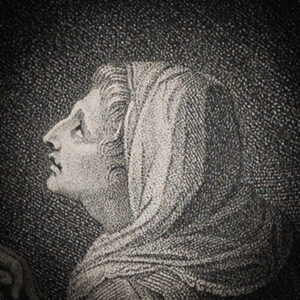 Shakespeare offers us instead a Third Way. The only power to draw Coriolanus back, and so secure an honorable peace and a common future, is found within the primordial social structure: the family. Coriolanus’ heart is reached through the appeals of Volumnia, his mother. This is obviously an invitation to Freud, but there is also something bigger at work. The Roman matron is the locus where familial and national identities converge. In the breakdown of every other social structure, we find a return to fundamental tribal allegiance. The family emerges as the decisive place where the fate of the nation and its greatness must be decided. Will the familial sphere with its august traditions, the sacred shrine of the ancestral mos maiorum, remain sacrosanct? Will it be or not be the site of further social chaos? That is the question.
Shakespeare offers us instead a Third Way. The only power to draw Coriolanus back, and so secure an honorable peace and a common future, is found within the primordial social structure: the family. Coriolanus’ heart is reached through the appeals of Volumnia, his mother. This is obviously an invitation to Freud, but there is also something bigger at work. The Roman matron is the locus where familial and national identities converge. In the breakdown of every other social structure, we find a return to fundamental tribal allegiance. The family emerges as the decisive place where the fate of the nation and its greatness must be decided. Will the familial sphere with its august traditions, the sacred shrine of the ancestral mos maiorum, remain sacrosanct? Will it be or not be the site of further social chaos? That is the question.
The family emerges as the decisive place where the fate of the nation and its greatness must be decided.
The risk here is high. For Coriolanus heaps scorn on tradition in openly deriding the people, and custom is the constitution in this polity. The ultimate end of such unsettling pride is easily seen in Antony and Cleopatra, when a disruptive new dynamic of eros enters the picture, which reconfigures the time-honored shape of Roman familial and national bonds. Rugged, manly, republican virtue turns to flaccid, imperial epicenity, as convention is openly flouted. The cohesive force of custom topples together with the Republic.
But this is not the only possible outcome. In the end of our play, Coriolanus dies but Rome endures — its survival owing entirely to the elemental power of family. For the weakened warrior, who bows weeping to his mother, who is softened as well by the sight of his own young child, becomes odious again to the old enemies of Rome—which is not a bad sign. We know from Volumnia’s own earlier speeches that the death of her son is an event that she herself reckons lightly: a cheap thing in the face of immortal honor and devotion to the common good. For the sacrificial victim it obviously costs something more dear. Yet by this act of self-sacrifice, a crushingly humble submission to the familial bearer of ancient tradition, moved by the force of a piety stronger than raging, elitist pride, the price of the Republic’s redemption is paid.
